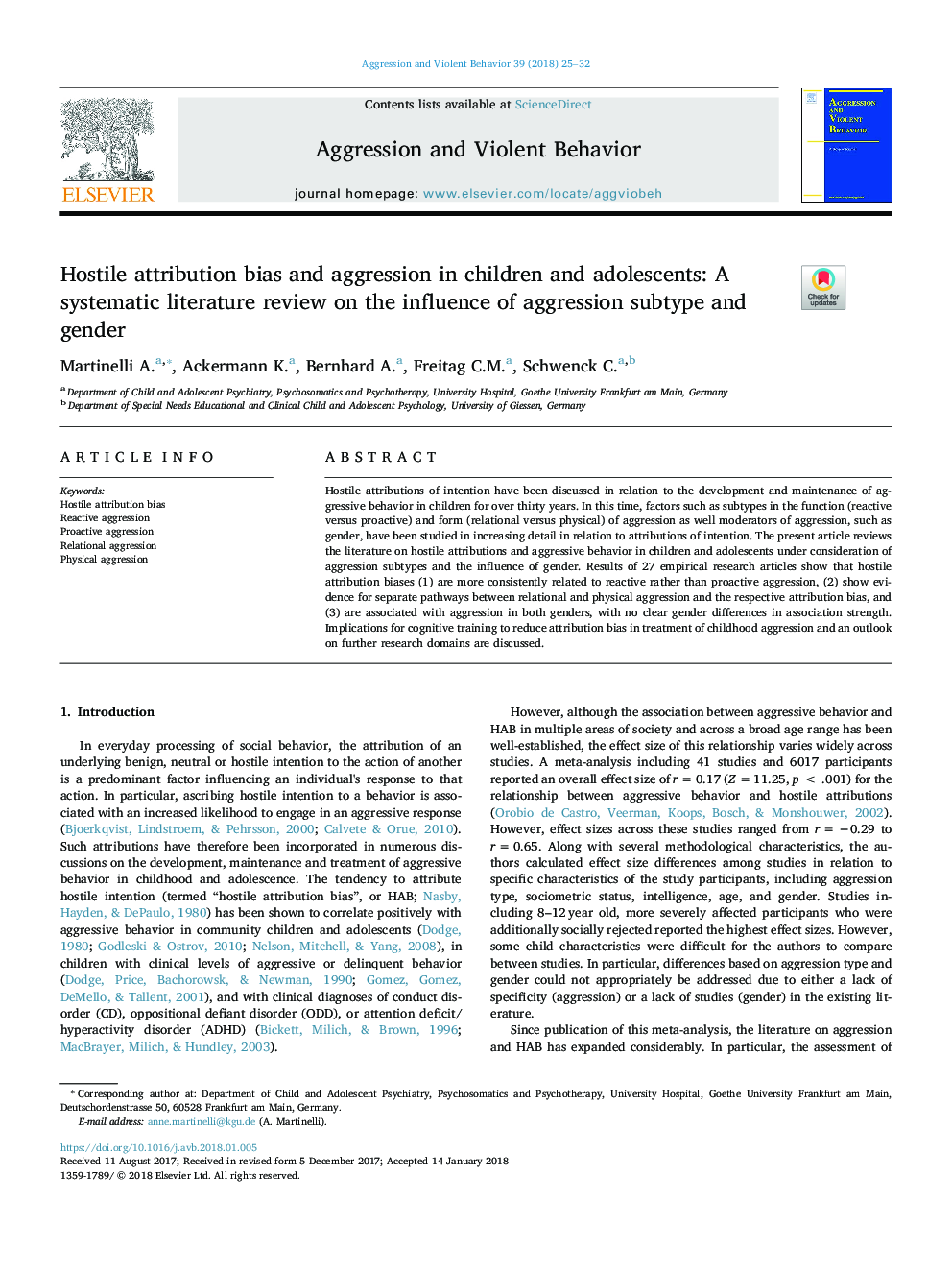| کد مقاله | کد نشریه | سال انتشار | مقاله انگلیسی | نسخه تمام متن |
|---|---|---|---|---|
| 6550004 | 1421882 | 2018 | 8 صفحه PDF | دانلود رایگان |
عنوان انگلیسی مقاله ISI
Hostile attribution bias and aggression in children and adolescents: A systematic literature review on the influence of aggression subtype and gender
ترجمه فارسی عنوان
تعصب و رفتار پرخاشگرانه خصمانه در کودکان و نوجوانان: یک بررسی ادبی سیستماتیک در مورد تأثیر نوع و جنسیت پرخاشگری
دانلود مقاله + سفارش ترجمه
دانلود مقاله ISI انگلیسی
رایگان برای ایرانیان
کلمات کلیدی
تعصب متعصب خصمانه، تجاوز واکنشی تجاوز پیشگیرانه، تجاوز ارتباطی، تجاوز فیزیکی،
ترجمه چکیده
خصومت خصمانه قصد در ارتباط با توسعه و حفظ رفتارهای پرخاشگرانه در کودکان بیش از سی سال مورد بحث قرار گرفته است. در این زمان، عوامل مرتبط با نوع فعالیت (واکنشی در مقابل پیشگیرانه) و فرم (روابط در مقابل فیزیکی) پرخاشگری و همچنین تعدیل کننده های پرخاشگری، مانند جنسیت، در افزایش جزئیات در ارتباط با اهداف قصد مورد مطالعه قرار گرفته است. در این مقاله، ادبیات مربوط به خصومت خصمانه و رفتار پرخاشگرانه در کودکان و نوجوانان تحت بررسی زیرگونه های پرخاشگری و تاثیر جنسیت بررسی شده است. نتایج حاصل از 27 مقاله تحقیق تجربی نشان می دهد که تعصبات متعلق به خصومت خصمانه (1) به طور پیوسته با تهاجم واکنش پذیر، به مثابه پیشگیرانه مرتبط است؛ (2) شواهدی برای مسیرهای جداگانه ای بین تجاوز نسبی و فیزیکی و تعصب مربوطه، و (3) با تجاوز در هر دو جنس، بدون تفاوت جنسیتی مشخص در قدرت ارتباطی. تأثیرات آموزش های شناختی برای کاهش تعصب ارجاعی در درمان پرخاشگری کودکان و چشم انداز در زمینه های تحقیقاتی دیگر مورد بحث قرار گرفته است.
موضوعات مرتبط
علوم پزشکی و سلامت
پزشکی و دندانپزشکی
پزشکی قانونی
چکیده انگلیسی
Hostile attributions of intention have been discussed in relation to the development and maintenance of aggressive behavior in children for over thirty years. In this time, factors such as subtypes in the function (reactive versus proactive) and form (relational versus physical) of aggression as well moderators of aggression, such as gender, have been studied in increasing detail in relation to attributions of intention. The present article reviews the literature on hostile attributions and aggressive behavior in children and adolescents under consideration of aggression subtypes and the influence of gender. Results of 27 empirical research articles show that hostile attribution biases (1) are more consistently related to reactive rather than proactive aggression, (2) show evidence for separate pathways between relational and physical aggression and the respective attribution bias, and (3) are associated with aggression in both genders, with no clear gender differences in association strength. Implications for cognitive training to reduce attribution bias in treatment of childhood aggression and an outlook on further research domains are discussed.
ناشر
Database: Elsevier - ScienceDirect (ساینس دایرکت)
Journal: Aggression and Violent Behavior - Volume 39, MarchâApril 2018, Pages 25-32
Journal: Aggression and Violent Behavior - Volume 39, MarchâApril 2018, Pages 25-32
نویسندگان
Martinelli A., Ackermann K., Bernhard A., Freitag C.M., Schwenck C.,
